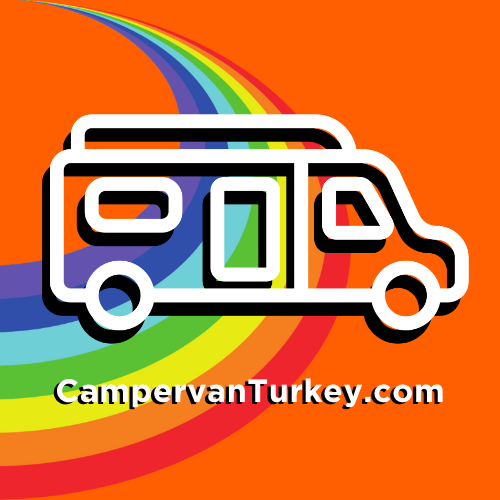Essential Earthquake Preparedness Tips for Caravan Dwellers
- Campervan Turkey

- 12 minutes ago
- 4 min read
Caravan living is all about adventure and flexibility, but it also comes with responsibilities—especially regarding safety. When you dwell in a caravan, being prepared for natural disasters, particularly earthquakes, is crucial. With the right preparations, you can significantly enhance your safety and that of your loved ones during seismic events. Let's explore effective steps specifically designed for caravan dwellers.
Understanding Earthquake Risks
Before you jump into preparing, take a moment to understand the risks associated with earthquakes in your area. Some regions are more prone to tremors, and knowing this can help you plan effectively.
For instance, California, which experiences around 10,000 earthquakes each year, demonstrates the importance of understanding local seismic activity. Familiarize yourself with local geological reports and engage with locals to gather insights. Stay updated on recent seismic trends—this knowledge will guide your safety measures during your travels.
Create an Emergency Plan
A well-thought-out emergency plan is key to earthquake preparedness. Start the conversation with everyone in your caravan about what to do during an earthquake.
Here are essential points to cover:
Identify safe spots within the caravan, such as areas near sturdy furniture that can provide protection.
Designate meeting points outside the caravan in case you get separated during an emergency.
Additionally, outline communication strategies. For example, if mobile networks go down, decide on a reliable backup plan, such as prearranged meeting spots or alternative ways to reach each other.
Don't just create the plan—rehearse it regularly to ensure everyone knows their roles. This practice can help reduce panic in the event of an earthquake.
Assemble an Emergency Kit
An emergency kit can be a lifesaver during an earthquake. Here's what to include:
Water: At least one gallon per person per day for at least three days. For example, a family of four should have a minimum of 12 gallons.
Non-perishable food: Pack nutrient-dense snacks—granola bars, canned goods, and dried fruits that are easy to transport.
First-aid supplies: Include bandages, antiseptics, pain relievers, and any prescription medications you may need.
Flashlights and batteries: Make sure to have a reliable source of light ready.
Multi-tool or survival tool: This can help with various tasks, from opening cans to making quick repairs.
Whistle: Keep a whistle handy to signal for help if needed.
Dust masks: These can filter contaminated air and protect against inhalation of dust after an earthquake.
Regularly check your kit for expiration dates and replace any items as needed to ensure everything is ready when you need it.
Secure Your Caravan
A well-secured caravan can help reduce damage and risks during an earthquake. Here are some practical steps to enhance your caravan's safety:
Anchor your caravan: Use tie-downs to secure your caravan to the ground if you'll be stationary for extended periods. This added stability can prevent rolling or tipping.
Minimize inside clutter: Secure heavy items and declutter your space. For instance, store heavy pots and pans in lower cabinets to avoid falling hazards.
Verify your locks: Familiarize yourself with how to secure windows and doors quickly. Ensure doors open outward to minimize the risk of getting trapped.
Taking these steps can significantly decrease the risks associated with being inside a caravan during an earthquake.
Stay Informed with Early Alerts
Keeping informed is vital for earthquake preparedness. Many areas have earthquake early warning systems that provide advance notice ahead of shaking.
Consider downloading local apps that send alerts and updates. For example, the ShakeAlert app in California can provide seconds of warning before shaking, giving you crucial time to prepare.
Also, familiarize yourself with local emergency services and evacuation routes. Accessing real-time information through websites or mobile applications can be invaluable in navigating challenges when an earthquake strikes.
Practice Your Safety Procedures
Regular drills can ensure that everyone knows what to do during an earthquake.
Dedicate time to practice the "Drop, Cover, and Hold On" technique. This method—dropping to your hands and knees, covering your head and neck, and holding until the shaking stops—can save lives.
Review your emergency plan consistently. Make sure everyone in the caravan understands their responsibilities during emergencies, especially in high-stress situations. This preparation will enhance your overall responsiveness.
Know What to Do During an Earthquake
Knowing how to react during an earthquake is crucial for safety. Follow these guidelines for optimal response:
Drop, Cover, and Hold On: When shaking starts, drop to your hands and knees, cover your head and neck, and hold on until it stops.
Stay inside your caravan: If you’re inside when the quake hits, stay there. Use cushions or blankets for added protection if available.
Avoid doors: Doors can swing and pose additional dangers. Instead, stay away from them.
Stay clear of windows and heavy objects: These areas can become hazardous due to falling objects.
Understanding these actions can significantly improve your safety during an earthquake.
Stay Vigilant After an Earthquake
Always be alert after the shaking stops. The risk of aftershocks or other hazards remains.
Check for gas leaks, damaged power lines, or other dangers around your caravan. If you smell gas, evacuate immediately and turn off the main supply.
Revisit your emergency kit and make any necessary adjustments. Additionally, discuss the experience with your group to reinforce communication strategies and review lessons learned.
Staying Prepared and Informed
Being prepared for earthquakes when living in a caravan is critical for your safety. By understanding risks, crafting an emergency plan, assembling a kit, and knowing the right actions, you can face seismic events with confidence.
Regularly practicing your procedures and staying informed about your environment will help alleviate stress and ensure you are ready for whatever comes your way. Remember, preparation fosters peace of mind as you travel and enjoy life on the road. Stay safe and ready for anything that may arise!






